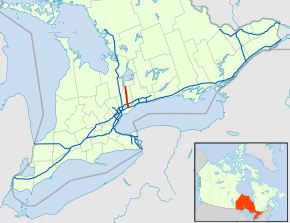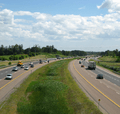Ontario Highway 404 facts for kids
Quick facts for kids
Highway 404 |
||||
|---|---|---|---|---|

Highway 404 within Ontario, Canada
|
||||
| Route information | ||||
| Maintained by the Ministry of Transportation of Ontario | ||||
| Length | 50.1 km (31.1 mi) | |||
| Major junctions | ||||
| South end | ||||
| North end | Woodbine Ave. (York road 8) | |||
| Location | ||||
| Major cities: | Toronto, Newmarket | |||
| Highway system | ||||
|
||||
Ontario Highway 404 is a major road in Ontario, Canada. It is part of the 400-series highways, which are like super-fast roads (freeways) designed for quick travel. This highway helps people travel between Toronto and the York Region.
Highway 404 starts in the big city of Toronto. It connects with another important road, Highway 401. From there, it stretches north for about 50 kilometers (31 miles). The highway ends at Woodbine Avenue in East Gwillimbury. It's a very busy road, especially during rush hour.
Contents
What is Highway 404?
Highway 404 is a controlled-access highway. This means you can only get on or off it at special ramps. It has many lanes to handle a lot of traffic. It helps connect people from the northern parts of the Greater Toronto Area to the city center.
Connecting Major Areas
This highway is super important for daily commuters. It links Toronto with several growing towns. These towns include Markham, Richmond Hill, and Newmarket. It helps people get to work, school, or visit friends and family.
How Long is Highway 404?
The total length of Highway 404 is about 50.1 kilometers. That's roughly 31 miles. It's a straight shot north from Highway 401. This makes it a quick way to travel across the region.
History of Highway 404
Building a highway like Highway 404 takes a lot of time and planning. It wasn't built all at once. Instead, it was opened in different sections over many years. This allowed the road to grow as the population in the area increased.
Early Days of Construction
The first part of Highway 404 opened in 1979. This section connected Highway 401 to Steeles Avenue. Over the years, more parts were added. This helped the highway reach further north. Each new section made it easier for people to travel.
Expanding the Highway
As more people moved to the towns north of Toronto, the highway needed to grow. Sections were added in the 1980s and 1990s. This included extending it past Highway 7 and then further north towards Newmarket. These expansions helped ease traffic.
Recent Changes and Upgrades
Even today, Highway 404 continues to be improved. Sometimes, new lanes are added. This includes special lanes for carpoolers, called HOV (High-Occupancy Vehicle) lanes. These lanes encourage people to share rides. This helps reduce the number of cars on the road.
Driving on Highway 404
Driving on Highway 404 is usually a smooth experience. However, like any busy highway, it can get crowded. Especially during peak travel times in the morning and afternoon. It's important to drive safely and follow all traffic rules.
Important Junctions
Highway 404 connects with several other important roads. One major connection is with Highway 407. Highway 407 is a toll highway, meaning you pay to use it. This connection gives drivers more options for their routes.
Cities Along the Way
As you drive north on Highway 404, you pass through or near several cities. These include Toronto, Markham, Richmond Hill, and Newmarket. Each city has its own unique features and attractions. The highway helps connect these communities.
Images for kids
-
Highway 404 looking north just north of the Highway 401 / Don Valley Parkway interchange, showing the interchange with Sheppard Avenue, with Fairview Mall and Consumers Road office park on the west and east sides of the freeway, respectively.
-
Highway 404 southbound, near the interchange with Steeles Avenue circa 2007. The southbound HOV lane has recently opened, while construction is underway on the northbound HOV lane.








